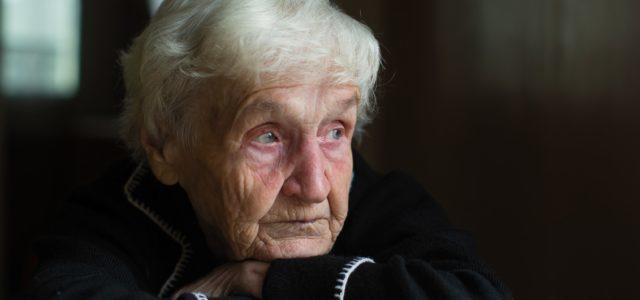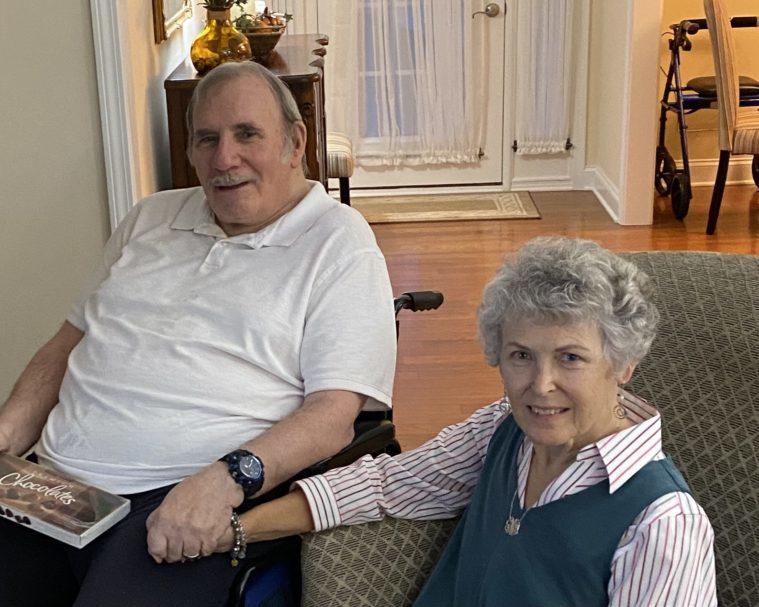
Caption
With long waits to see family members, “people are just withering away,’’ says Melanie McNeil, the state’s chief long-term care ombudsman.
Credit: Stock photo

With long waits to see family members, “people are just withering away,’’ says Melanie McNeil, the state’s chief long-term care ombudsman.
At first, Gail Manter thought the pandemic wouldn’t last long, and that she’d be able to see her husband, Tom, sooner rather than later.
But the COVID-19 crisis in this country has now dragged on for 11 months.
And instead of visiting Tom, 73, almost every day at his Hartwell nursing home, as she used to do, Gail has only had a couple of outdoor visits with him during the pandemic. Tom has Parkinson’s disease, and has been in the facility two years.
Long-term care visitation has been restricted by Gov. Brian Kemp’s executive order and under federal guidelines.
The Manters once tried a visit through glass double doors. “We tried the glass thing, but we both cried,’’ says Gail. “It was terrible.’’
Restrictions on visits were imposed early in the COVID pandemic, as nursing homes and other long-term care facilities endured a horrific disease toll. More than 4,000 Georgia residents of these homes have died — about one-third of the state’s confirmed deaths from COVID-19.

Gail and Tom Manter in their home.
But now, with nursing home residents getting vaccinations, the state’s long-term care ombudsmen have urged Kemp to ease his rules and allow an “essential visitor’’ – typically a family member – to come into the building to see an individual loved one.
Gail Manter wants to see that happen fast. “Everybody needs to see their family. We need to be touched.’’
The nursing home staff has been good to Tom, she says, but “he’s deteriorating mentally. That is the worst thing.’’
Mallory Blount, a spokeswoman for Kemp, said Thursday that the state is following CDC guidelines on visitation. State officials, she said, “will continue to evaluate ongoing progress in vaccination of these facilities and ensure future guidance reflects the risk of COVID-19 to residents and staff, while also making every effort to allow our most vulnerable Georgians to safely return to normal.”
In the Legislature, a bill by Rep. Ed Setzler (R-Acworth) would bar hospitals and nursing homes from preventing family from visiting loved ones during health emergencies, the AJC reported Thursday. If it becomes law, it would go into effect July 1.
More than 85,000 Georgians reside in long-term care facilities.
The ombudsmen’s proposal says the essential visitor would have to wear personal protective equipment, complete a health screening, and submit to regular viral testing.
With long waits to see family members, “people are just withering away,’’ says Melanie McNeil, the state’s chief long-term care ombudsman. “If you are used to seeing your family member every day, and you haven’t seen them for months, you tend to want to give up.’’
The federal Center for Medicare & Medicaid Services loosened its visitation guidelines to allow for “compassionate care’’ exceptions in September. But some facilities are interpreting those exceptions to apply only to end-of-life situations, McNeil said.
The nursing home industry is against the visitation change.
“While our members would love nothing more than to reunite residents with families and return to a level of normalcy in regards to visitation, we believe it would be unwise to hasten the ease in restrictions before it is safe to do so,’’ said Devon Barill, a spokeswoman for the Georgia Health Care Association, which represents long-term care facilities.
“With the availability of the vaccine, we are so close to being able to make a sustained change in the direction of this pandemic and its impact on long-term care communities and policies surrounding visitation,” Barill added. “We do not see the limitations on visitation being relaxed until there is a lower incidence of the virus in the community.’’
McNeil, the ombudsman, said that an essential visitor procedure could mean more work for the facility, “but it will be better for residents.’’
For older adults, loneliness and isolation can impact their physical health as well as mental health, said Kerstin Gerst Emerson of the Institute of Gerontology at the University of Georgia’s College of Public Health.
These factors can weaken the immune system and raise a person’s blood pressure, Emerson said. “If your mind is not happy, often your body is not happy.’’
The pandemic has exacerbated these isolation problems with the cutoff of many social interactions. Older adults are resilient, Kersten said, but many are struggling.
Manter, who like her husband has Parkinson’s, participates in a Facebook group, Georgia Caregivers for Compromise, which pushes for expanding visitation. There are similar groups in other states.
“My story is a piece of cake compared to others,’’ she says. “My husband is not dying but he has declined.’’
“People are dying from isolation every day.’’
This story comes to GPB through a reporting partnership with Georgia Health News.